AMD Schola is a library for developing reinforcement learning (RL) agents in Unreal Engine, and training with your favorite python-based RL frameworks: Gym, RLlib and Stable Baselines 3.
We also include ScholaExamples, featuring seven environments demonstrating the usage of Schola to train and power agents in Unreal Engine.
Download the latest version: v1.1.1
Schola v1.1.1
This is a minor update featuring bug fixes for Schola and ScholaExamples, as well as extended documentation for Schola.
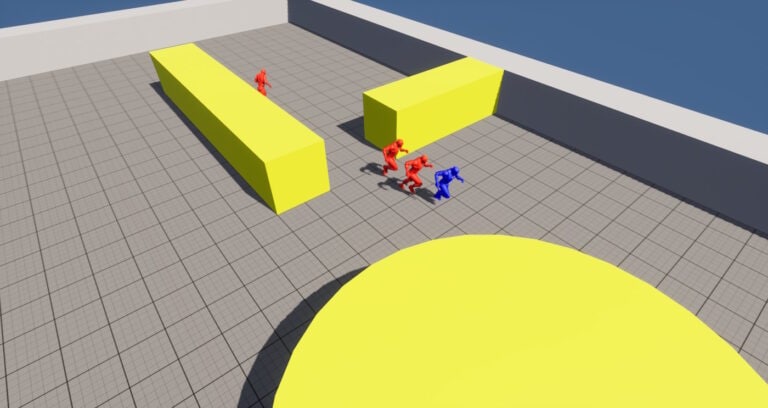
Advancing AI in Video Games with AMD Schola
By connecting popular open-source RL libraries (written in Python) with the visual and physics capabilities of Unreal Engine, Schola empowers AI researchers and game developers alike to push the boundaries of intelligent gameplay.
What’s New in Schola v1.1.0 and ScholaExamples v1.1.0
This release includes updates to both Schola and ScholaExamples. Schola v1.1.0 introduces support for Unreal Engine 5.5, several new features, and stability improvements. ScholaExamples v1.1.0 ensures compatibility with Schola v1.1, adds a new example called RaceTrack, and updates the Pong example to leverage the new Camera Sensors.
Schola v1.1.0
New Features
- Launch Script Extensions: You can now inject callbacks into
launch.pyusing Python entrypoint plugins. - Camera Sensors: Schola now includes a camera sensor, which can integrate with an existing
SceneCaptureComponent2Dto provide vision or depth input to an agent. - (Beta) Behavioral Tree + RL: Use the new
AgentStepBTTask to embed RL models into your behavioral trees. - Support for Adding and Removing Agents: Agents can now be dynamically added or removed during training episodes. Inference Agents can now be dynamically added or removed from a level at any time, without depending on the subsystem.
- Observer/Actuator Wrappers: Observers and Actuators can now be wrapped to easily build reusable utilities. This update also includes some premade wrappers, such as frame stacking, clipping, and normalization.
Improvements
- Improved ONNX Format: Models exported to ONNX now use a more human-readable format to simplify debugging and enable name-based mapping of observers/actuators to model inputs/outputs.
- Shaped Box Spaces: Schola now supports BoxSpaces with a non-flat shape (e.g., images of shape
(3, 64, 64)instead of(1, 12288)). - Documentation: Python commands and scripts are now comprehensively documented with Sphinx.
- Support for Unreal Engine 5.5
Bug Fixes
- Fixed several script option not working correctly.
Known Incompatibilities and Issues
- Models trained with Schola v1.0.0 must be re-exported to ONNX using Schola v1.1.
- Schola v1.1 is not compatible with Unreal Engine 5.4.
- RLlib does not support camera observers without an additional wrapper to convert observations to the “channels last” format.
ScholaExamples v1.1.0
New Example
- RaceTrack: A new demo featuring a car that learns to follow a spline-based track.
Updated Example
- Pong: The Pong example has been updated to utilize the new Camera Sensors introduced in Schola v1.1.
Prerequisites
Features
Inference in C++
Schola provides tools for connecting and controlling agents with ONNX models inside Unreal Engine, allowing for inference with or without Python.
Simple Unreal Interfaces
Schola exposes simple interfaces in Unreal Engine for the user to implement, allowing you to quickly build and develop reinforcement learning environments.
Reusable Actions and Sensors
Schola supports building reusable sensors and actuators, to quickly design new agents from existing components.
Multi-agent Training
Train multiple agents to compete against each other at the same time using RLlib and multi-agent environments built with Schola.
Vectorized Training
Run multiple copies of your environment within the same Unreal Engine process to accelerate training.
Headless Training
Run training without rendering to significantly improve training throughput.
Sample Environments
Basic
The Basic environment features an agent that can move in the X-dimension and receives a small reward for going five steps in one direction and a bigger reward for going in the opposite direction.
MazeSolver: Using Raycasts
The MazeSolver environment features a static maze that the agent learns to solve as fast as possible. The agent observers the environment using raycasts, moves by teleporting in 2 dimensions and is given a reward for getting closer to the goal.
3DBall: Physics Based Environments
The 3DBall environment features an agent that is trying to balance a ball on-top of itself. The agent can rotate itself and receives a reward every step until the ball falls.
BallShooter: Building Your Own Actuator
The BallShooter environment features a rotating turret that learns to aim and shoot at randomly moving targets. The agent can rotate in either direction, and detects the targets by using a cone shaped ray-cast.
Pong: Collaborative Training
The Pong environment features two agents playing a collaborative game of pong. The agents receive a reward every step as long as the ball has not hit the wall behind either agent. The game ends when the ball hits the wall behind either agent.
Tag: Competitive Multi-Agent Training
The Tag environment features a 3v1 game of tag, where one agent(the runner) has to run away from the other agents which are trying to collide with it. The agents move using forward, left and right movement input, and observe the environment with a combination of ray-casts and global position data.
RaceTrack: Controlling Chaos Vehicles with Schola
The RaceTrack environment features a car implemented with Chaos Vehicles, that learns to follow a race track. The agent controls the throttle, break and steering of the car, and can see it’s velocity and position relative to the center of the track.
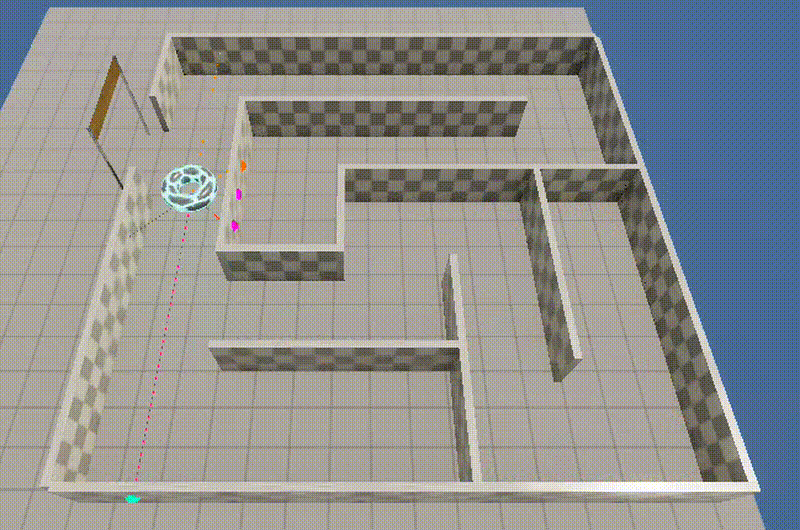
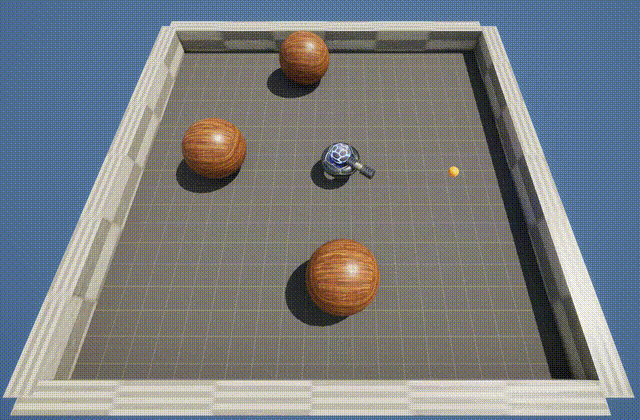
Additional resources
Version history
This is a minor update featuring bug fixes for Schola and ScholaExamples, as well as extended documentation for Schola.
What’s New in Schola v1.1.0 and ScholaExamples v1.1.0
This release includes updates to both Schola and ScholaExamples. Schola v1.1.0 introduces support for Unreal Engine 5.5, several new features, and stability improvements. ScholaExamples v1.1.0 ensures compatibility with Schola v1.1, adds a new example called RaceTrack, and updates the Pong example to leverage the new Camera Sensors.
Schola v1.1.0
New Features
- Launch Script Extensions: You can now inject callbacks into
launch.pyusing Python entrypoint plugins. - Camera Sensors: Schola now includes a camera sensor, which can integrate with an existing
SceneCaptureComponent2Dto provide vision or depth input to an agent. - (Beta) Behavioral Tree + RL: Use the new
AgentStepBTTask to embed RL models into your behavioral trees. - Support for Adding and Removing Agents: Agents can now be dynamically added or removed during training episodes. Inference Agents can now be dynamically added or removed from a level at any time, without depending on the subsystem.
- Observer/Actuator Wrappers: Observers and Actuators can now be wrapped to easily build reusable utilities. This update also includes some premade wrappers, such as frame stacking, clipping, and normalization.
Improvements
- Improved ONNX Format: Models exported to ONNX now use a more human-readable format to simplify debugging and enable name-based mapping of observers/actuators to model inputs/outputs.
- Shaped Box Spaces: Schola now supports BoxSpaces with a non-flat shape (e.g., images of shape
(3, 64, 64)instead of(1, 12288)). - Documentation: Python commands and scripts are now comprehensively documented with Sphinx.
- Support for Unreal 5.5
Bug Fixes
- Fixed several script option not working correctly.
Known Incompatibilities and Issues
- Models trained with Schola v1.0.0 must be re-exported to ONNX using Schola v1.1.
- Schola v1.1 is not compatible with Unreal 5.4.
- RLlib does not support camera observers without an additional wrapper to convert observations to the “channels last” format.
ScholaExamples v1.1.0
New Example
- RaceTrack: A new demo featuring a car that learns to follow a spline-based track.
Updated Example
- Pong: The Pong example has been updated to utilize the new Camera Sensors introduced in Schola v1.1.
Prerequisites
- Just released!
- Unreal Engine v5.4 required.
Don't miss some of our other Unreal Engine content
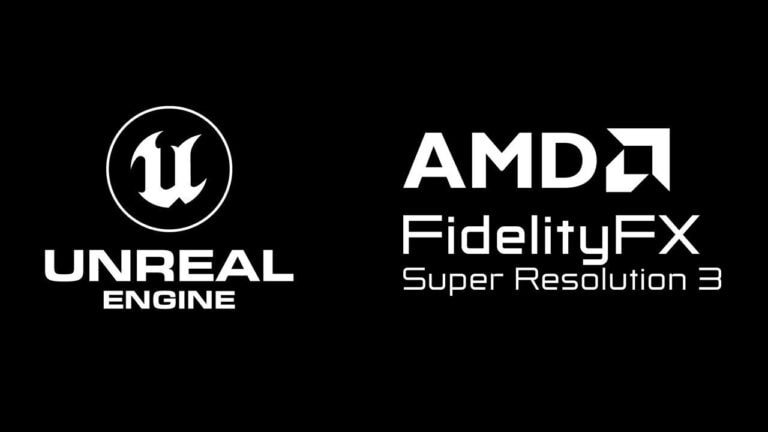
AMD FidelityFX Super Resolution 3.1.3 Unreal Engine plugin guide
Download the AMD FSR 3.1.1 plugin for Unreal Engine, and learn how to install and use it.

Unreal Engine
Develop for Unreal Engine on AMD hardware with our plugin, performance and feature patches, including FidelityFX support.
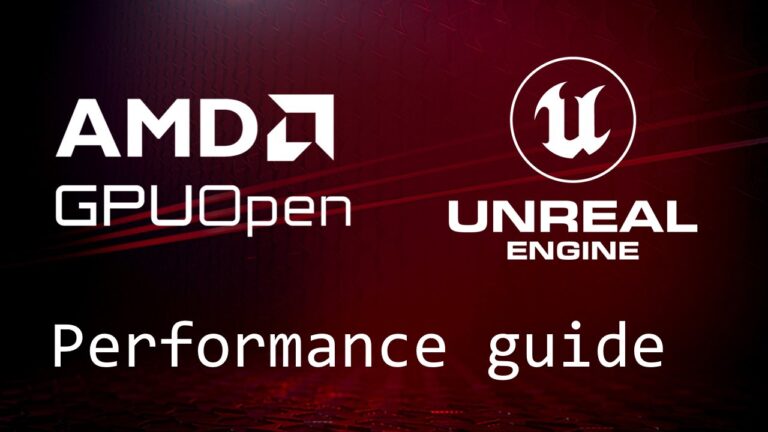
Unreal Engine performance guide
Our one-stop guide to performance with Unreal Engine.

